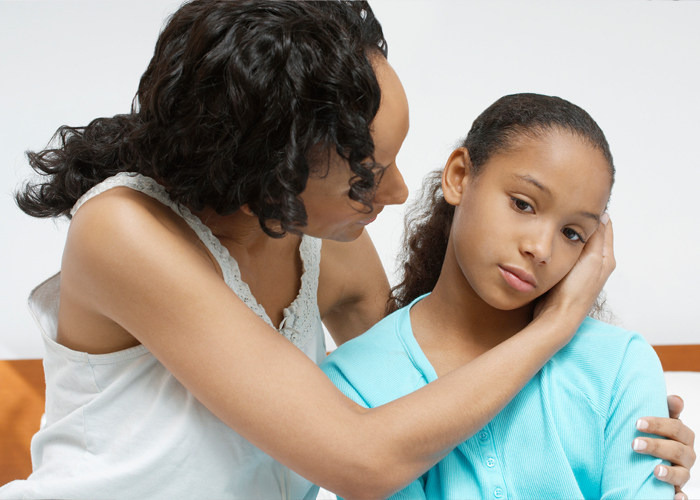When You Just Aren’t Comfortable Getting Help for Your Child
I love talking with parents of gifted and twice-exceptional kiddos. Apart from the comradery and the peace that comes with knowing you’re not alone in this often-difficult journey, it’s so uplifting to encourage them, hug them, to be there when the lightbulb goes off as you explain why their child behaves they way they do. The relief that washes over a mom when she realizes that her child is wired to act a certain way and that it is not a reflection of her parenting – whew, that just fills my bucket right up. The tears stream and the shoulders relax, we all want to shout YES! from the rooftops as we begin to make sense and find hope in the midst of the overexcitable storm we’ve been living in.
Often times, these conversations lead down the path of twice-exceptionalities – those kids who are both gifted and living with a disorder or diagnosis that makes life (and gifted identification) a little bit harder. ADHD, dyslexia, autism, and my favorite, anxiety, are the most common difficulties that parents are struggling to help their child manage (though certainly many more exist). Frequently, though, this glow of understanding and acceptance is interrupted when the subject of therapy and medication comes up.
“No, we don’t really feel like medication is right at this time.”
“I don’t feel comfortable putting her medication.”
“We’d rather not try counseling, we’re working with behavior charts at home instead.”
“I honestly just don’t believe in therapy.”
Over and over, sentiments similar to these are said, with deep conviction, when discussing the needs of their child.
I fully admit to having felt similarly at one time. I tried everything possible to avoid putting my child on medication – diet, oils, herbs, prayers, exercises, routines, counseling, and yes, behavior charts. I felt like picking up a big orange prescription bottle for such a little body was perverse in some way, defeating in another. As though giving his body the chemicals and relief it needed were somehow admitting a loss or a failure on my part.
I get it, I do.
When my own mother was first diagnosed with mental illness and began taking strong medications to help counteract the chemical imbalances, I balked. I chastised. I judged. I saw each fistful of pills as a sign of weakness and each new prescription as an indicator that she just hadn’t worked hard enough at getting better.
Then I went to college to earn a counseling degree, and within weeks I was tearfully apologizing over the phone to my poor, sick mother who just wanted to get better.
Related: Mislabeled Behavior and Undiagnosed Giftedness , Homeschooling Because of Mental Illness
It’s hard being a kid, harder than it was when we were kids. There are sources of pressure and input that exist all around them that weren’t even a thought when we were in our formative years. Add in the confusion of a brain that works faster than they know how to handle and a misfiring brain with crossed wires and chemical imbalances, and it can be downright torture. Kids who are struggling with anxiety, depression, ADHD, mood disorders, personality disorders… they’re hurting. Their brains and bodies are failing them and they are tiny little people who don’t know what to do about it. Their small shoulders cannot bear the weight of our pride, our fears, our hopes that a diet change will make them better.
If a child were in need of a wheelchair ramp, would we think twice before installing it? If our sons were in casts or our daughters nursing stitches, would we hesitate to accommodate them and ensure the best possible environments for them to heal in?
If a child has type 1 diabetes, do we hesitate to provide them with the insulin they depend upon to live?
If a child has dyslexia, tracking issues, speech issues – do we hope they’ll resolve themselves or do we seek accommodations and programs that will meet them where they are, provide scaffolding, and teach them vital skills to grow and learn with?
Mental health issues are brain issues, just like a brain with dysgraphia. Many mental health issues are the result of a chemical imbalance, not unlike diabetes or anemia. Yet they carry a stigma that often results in a hesitation to seek treatment. These things are beasts that must be battled. They won’t slink away, embarrassed at having been caught. They won’t fade with time in the sun like a stained sheet. These are very real, very quantifiable invaders that are threatening to steal our childrens’ happiness, childhoods, even their lives, and we cannot agree to play nice with them in the hopes of a peaceful parting between us. When it comes to our children’s mental health, we must go on the offensive or we will forever be living defensively.
Related: Name It to Tame It | When Anxiety Looks Like Anger , Helping Your Child Cope With Anxiety
With a counseling degree that hangs beautifully framed, yes, I’m a little biased.
With an anxiety disorder myself that is treated with medication, yes, I’m a little biased.
With a mother who is mentally ill and wasn’t always medicated, yes, I’m pretty biased.
With children who have benefitted greatly from therapy and found help, strength, and relief they otherwise would not have stumbled upon or figured out for themselves, yeah, I’m a lot biased.
These kids of ours, we’re entrusted with their care. We make a lot of decisions on their behalf, hoping and praying and fretting that they’re the right ones. I realize that seeking counseling or agreeing to fill the prescription isn’t a light decision. I’m well aware of how over-diagnosed and thus how over-medicated so many of today’s children are. I’m well-versed in the scary side effects of some very strong medications and I know that the first therapist you waited 10 months to see isn’t always a great fit.
I’m not advocating completely sedating your child. I’m not asking you to risk their lives. If the risks outweigh the benefits, then by all means, move on and find an alternative. All I’m asking is that you consider their pain. Consider how scared they are to feel anxiety without knowing what it is. Consider how painful it must be to wake up depressed and not understand why. Consider that their understanding of their condition is not the understanding that you have, and that you have access to people who can help.
It’s hard, very hard, very humbling and scary to realize and admit that you can’t do this yourself. To recognize that you, their parent, who loves them and knows them and supports them more than anyone else, cannot fix this yourself.
You just can’t.
You need help.
Our kids need help.
Needing help from someone else is painful to admit.
But oh, how life-changing it is when that help comes.
I still feel a bit of shame when I think back to how I graduated with a 4.0 when I earned my counseling degree and missed my own son’s anxiety. I tried for years to fix it by myself. I read all the books, dusted off my notes and texts, contacted colleagues – I tried to be my son’s counselor. But even with all of the training that the state of Texas requires, I needed help. I just couldn’t do this by myself. I couldn’t help him on my own, and that was a hard pill to swallow… no pun intended.
If you’re on the fence about seeking professional help, if the next steps beyond what you’ve tried require an appointment or a prescription, please take the time to soul search and ask yourself why it is you’re so hesitant.
You’re not failing as a parent to get them help.
You’re not failing as a parent because they need help at all.
You’re not failing as a parent because you’re changing your stance on medication.
You’re not failing as a parent because you don’t fully understand what’s going on in those little minds of theirs.
You’re not failing as a parent, period. It’s just time to expand your village.




